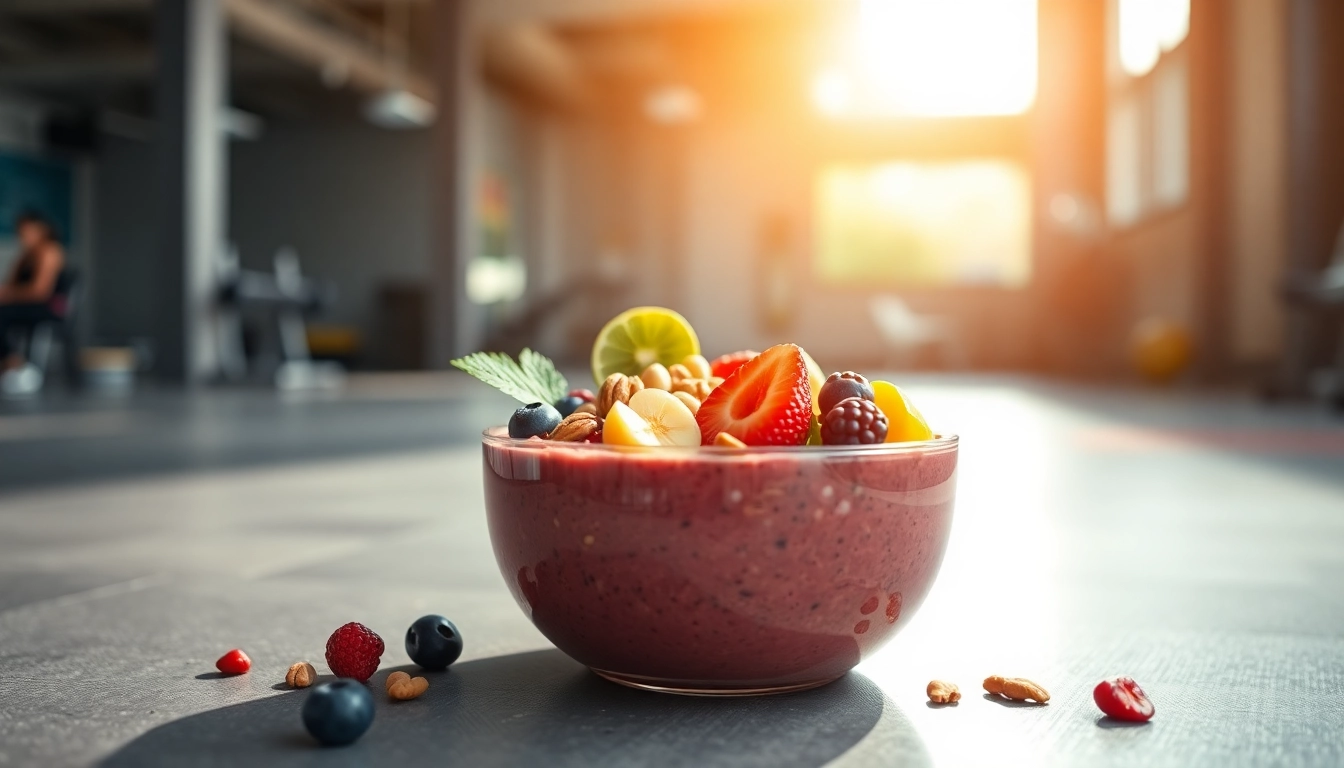Essential Postworkout Nutrition: Foods and Tips for Optimal Muscle Recovery

Understanding Postworkout Nutrition
Postworkout nutrition is an essential aspect of any fitness regimen, particularly for those engaged in intense training programs. Athletes and fitness enthusiasts alike understand the importance of replenishing and repairing their bodies properly after a workout. This means consuming the right foods and nutrients that support muscle recovery, energy restoration, and overall fitness goals. The right postworkout nutrition can enhance performance and vitality, ultimately contributing to long-term athletic success.
What is Postworkout Nutrition?
Postworkout nutrition refers to the dietary habits and food choices you make after your exercise sessions. It primarily focuses on replenishing nutrients lost during workouts, aiding in muscle repair and recovery. This involves a balanced intake of carbohydrates, proteins, and essential fats, tailored to your specific training intensity and goals. The goal is not only to refuel but also to enhance recovery, improve muscle synthesis, and boost performance in subsequent workouts.
The Importance of Timing
The timing of your nutritional intake post-exercise is crucial. The body is in a state of heightened insulin sensitivity in the 30 to 60 minutes following a workout. Consuming a balanced meal or supplement during this window is essential as it helps to replenish glycogen stores, repair muscle tissues, and mitigate fatigue effectively. Research indicates that delaying nutrient intake beyond this window can hinder recovery and performance.
Nutritional Goals Post-Workout
The primary goals of postworkout nutrition include:
- Muscle Repair: Consuming protein helps to repair and rebuild muscle fibers that break down during exercise.
- Glycogen Replenishment: Carbohydrates are vital for restoring glycogen stores, particularly after high-intensity or endurance workouts.
- Fluid and Electrolyte Replacement: Rehydration is critical to restore fluid balance and prevent fatigue.
- Overall Recovery Support: Adequate nutrition helps to enhance recovery speed, reduces muscle soreness, and prepares the body for future training.
Top Foods for Postworkout Recovery
Selecting the right foods for recovery is essential to optimizing your training outcomes. Below are the top food categories you should consider integrating into your postworkout meals.
High-Quality Protein Sources
Proteins are the building blocks of muscle, and consuming them post-exercise is integral for recovery. High-quality protein sources include:
- Lean Meats: Chicken, turkey, and fish are excellent sources of lean protein and contain all essential amino acids.
- Dairy Products: Greek yogurt and cottage cheese provide a combination of fast- and slow-digesting proteins.
- Plant-Based Proteins: Options such as lentils, chickpeas, quinoa, and edamame are great alternatives for vegetarians.
- Protein Shakes: If you’re on the go, protein shakes can provide a quick and convenient source of high-quality protein.
Carbohydrate-Rich Snacks
Carbohydrates replenish glycogen stores depleted during workouts. Including the right types of carbs can significantly aid recovery, and great sources include:
- Fruits: Bananas, berries, and apples are rich in natural sugars and fiber.
- Whole Grains: Brown rice, quinoa, and oats provide complex carbohydrates that digest slowly and sustain energy levels.
- Starchy Vegetables: Sweet potatoes and corn are nutrient-dense and provide a good carbohydrate source.
Hydration Strategies
Hydration is often overlooked but plays a significant role in postworkout recovery. Rehydrating effectively helps restore the fluid balance and supports overall bodily functions.
- Water: Drinking water is essential, especially if you have sweat profusely during your workout. Aim for at least 16 to 24 ounces of water after exercising.
- Electrolyte Drinks: For longer workouts or intense sessions, consider beverages that replenish lost electrolytes, such as sports drinks or coconut water.
- Herbal Teas or Infused Water: These can be refreshing and hydrating while providing antioxidants.
Creating Your Ideal Postworkout Meal
Your postworkout meal should be designed to meet your recovery goals while being light and easy to digest. Here’s how to create an ideal postworkout meal.
Components of a Balanced Meal
A balanced postworkout meal typically contains a combination of:
- Proteins: Aim for 20-30 grams to aid in muscle repair.
- Carbohydrates: Include around 40-60 grams to help replenish glycogen stores.
- Healthy Fats: While it’s best to keep fat lower immediately postworkout, including sources like avocados or nuts in a meal can provide sustained energy.
- Hydration: Don’t forget to drink water or an electrolyte-rich beverage to maintain hydration.
Sample Postworkout Meals
Here are some meal ideas to inspire your postworkout nutrition:
- Grilled Chicken with Quinoa and Veggies: A balanced meal with protein and complex carbohydrates.
- Protein Smoothie: Blend whey protein, bananas, and spinach with almond milk for a quick recovery drink.
- Omelet with Spinach and Whole Grain Toast: Eggs provide quality protein, while whole grains offer carbohydrates.
- Greek Yogurt with Berries and Honey: A simple yet effective postworkout option packed with protein and carbohydrates.
Recipes to Try
Here are two simple recipes that you can whip up easily post-exercise:
Protein-Packed Breakfast Bowl
Ingredients:
- 1 cup of cooked quinoa
- 1 scoop of protein powder (vanilla or chocolate)
- 1 banana, sliced
- 1 tablespoon of almond butter
- Drizzle of honey (optional)
Instructions: Combine cooked quinoa and protein powder in a bowl. Top with banana slices, almond butter, and honey. Enjoy!
Simple Chickpea Salad
Ingredients:
- 1 can of chickpeas, drained and rinsed
- 1 cup of chopped veggies (cucumber, bell pepper, tomatoes)
- 2 tablespoons of olive oil
- Juice of 1 lemon
- Salt and pepper to taste
Instructions: Mix all ingredients in a bowl. Season to taste. Serve cold for a refreshing recovery meal.
Common Mistakes to Avoid After Workouts
Overeating vs. Undereating
Post-exercise, people often struggle with eating the right amount of food. Overeating can lead to unwanted weight gain, while undereating limits recovery and muscle growth. Focus on portion control based on your caloric needs to ensure optimal recovery without accumulating excess calories.
Ignoring Hydration Needs
Neglecting hydration can lead to fatigue, dizziness, and longer recovery times. Always prioritize drinking water or electrolyte-replenishing beverages post-exercise to rehydrate effectively.
Neglecting Micronutrients
Focusing solely on macronutrients (carbs, proteins, and fats) can lead to deficiencies in essential vitamins and minerals. Incorporate a variety of vegetables and fruits in your postworkout meals to ensure a well-rounded nutrient profile that supports overall health.
Monitoring Your Postworkout Recovery
Monitoring how your body responds to postworkout nutrition can help you fine-tune your approach for better results. Here’s what to observe:
Recognizing Signs of Recovery
Listen to your body. Signs such as diminished muscle soreness, restored energy levels, and improved performance metrics indicate effective recovery. On the other hand, persistent fatigue or muscle pain may suggest inadequate nutrition and recovery efforts.
Using Supplements Wisely
While whole foods are always the best choice, some may require supplementation to meet their nutritional goals. Creatine, BCAAs, or whey protein can be ideal additions, but these should complement a solid nutrition plan rather than replace whole foods.
Adjusting Based on Performance Metrics
Track your workouts and recovery times. If performance begins to plateau or decline, it may be time to reassess your nutrition strategy, adjusting your postworkout intake as necessary to meet your evolving fitness goals.







